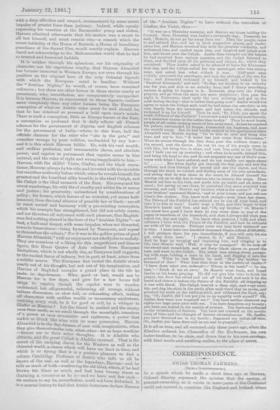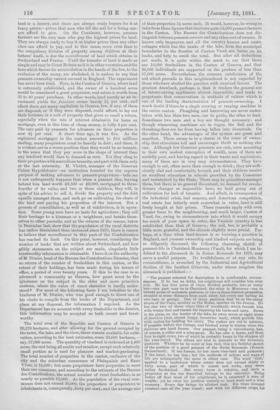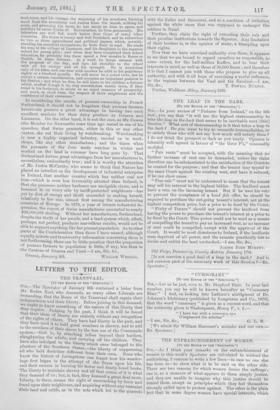known ten times as lunch, and had been twenty times
as IN a speech which he made a short time ago at. Darwen, charming a raconteur as he is—and we have met few such— Colonel Stanley expressed the opinion that the system. of we venture to say lie, nevertheless, could not have disturbed. It peasant-ownership as it exists in some parts of the Continent is .a mental luxury to find that Arabic historians declare Haroun could not succeed in. countries like England: and Ireland; where land is a luxury, and there are always ready buyers for it at fancy prices,—prices that men who till the soil for a living can- not afford to give. On the Continent, however, yeoman farmers are the very men who pay the highest prices for land. They are always ready to buy it at higher prices than any other class can afford to pay, and to this cause, more even than to the compulsory division of property among children at their fathers' death, is due the morcellement of land which obtains in Switzerland and France. Until the transfer of land is made as simple and easy in Great Britain as it is in other countries, and the laws which favour its accumulation in the hands of the few, to the exclusion of the many, are abolished, it is useless to say that peasant-ownership cannot succeed in England. The experiment has never been tried. Here, in the Canton iaf Geneva, where land is extremely subdivided, and the owner of a hundred acres would be considered a great proprietor, real estate is worth from 35 to 40 years' purchase. In other words, land merely as an in- vestment yields the faineant owner barely 21 per cent., and albeit there are many capitalists in Geneva, few, if any, of them are disposed, or if they were disposed, could afford, to lay out their fortunes in a sort of property that gives so small a return, especially when the rate of interest obtainable for loans on mortgage, even in this time of cheap money, is fully 4 per cent. The rate paid by peasants for advances on their properties is now 4i per cent. A short time ago, it was five. As the registered mortgages in the canton amount to five millions sterling, many proprietors must be heavily in debt ; and these, it is evident, are in a worse position than they would be as tenants, in the sense that they pay more in the shape of interest than any landlord would dare to demand as rent. Yet they cling to their properties with marvellous tenacity, and part with them only at the last extremity. M. Viridet, manager of the Genevan Caisse Hypoth6caire—an institution founded for the express purpose of making advances to peasant-proprietors—tells me it not 'infrequently happens that when a peasant dies, leaving behind him land worth £1,500 or £2,000, mortgaged. to three- fourths of its value, and two or three children, they will, in spite of his advice to sell it, divide the property and the debt equally amongst them, and each go on cultivating his share of the land and paying his proportion of the interest. But a process of consolidation, as well as of subdivision, is in opera- tion. Some young men have no taste for agriculture ; they sell their heritage to a kinsman or a neighbour, and betake them- selves to other pursuits, and as the returns of the census, taken in December last, show that the population of the rural districts has rather diminished than increased since 1870, there is reason to believe that morceilement in this part of the Confederation has reached its limit. On this point, however, considering the number of books that are written about Switzerland, and how glibly statements on the subject are made, singularly little trustworthy information is obtainable. I have it on the authority of M. Dimier, head of the Bureau des Contributions Directes, that no return of the number of freeholders in this canton, or the extent of their holdings, has been made during his tenure of office, a period of over twenty years. If this be the case in so advanced. a community as Geneva, how great must be the ignorance on the subject in the older and more primitive cantons, where the value of exact statistics is hardly under-
stood P For most of the following facts I am beholden to the kindness of M, Dimier, who was good enough to direct one of his clerks to compile from the books of the Department, and place at my disposal, the information I required. As the Department has an account with every freeholder in the district, this information may be accepted as both recent and trust- worthy.
The total area of the Republic and Canton of Geneva is 28,270 hectares, and after allowing for the ground occupied by the town, the lake, and the river, there remain available for culti- vation, according to the best estimates, some 23,000 hectares,— say, 57,000 acres. The quantity of vineland is reckoned at 4,400 acres, the rest being all arable and meadow, except such relatively small portion as is used for pleasure and market-gardening. The total number of properties in the canton, exclusive of the city and the suburban communes of Plainpalais and Eaux Vives, is 16,000; but some proprietors have properties in more than one commune, and according to the estimate of the Bureau des Contributions, the actual number of rural freeholders is as nearly as possible 12,000. As the population of the rural com- munes does not exceed 30,000, the proportion of proprietors to inhabitants is, consequently, forty per cent., and the average size
of their properties 5 acres each. It would, however, be wrong to iufer from these figures that there are quite 12,000 yeomen farmers in the Canton. The Bureau des Contributions does not dis- tinguish between peasant-owners and any other sort of owners. It knows only taxpayers, and all the country houses and rustic cottages which line the banks of the lake, from the municipal boundaries to the frontier of Canton Vaud, are borne on its books, and help to swell the total. But after all deductions are made, it is quite within the mark to say that there are 10,000 freeholders in the Canton of Geneva, and that 26,000 individuals are supported on the produce of less than 57,000 acres. Nevertheless, the extreme subdivision of the soil which prevails in this neighbourhood is not regarded by those whohave studied the question with unmixed favour. The greatest drawback, perhaps, is that it renders the general use of labour-saving appliances almost impossible, and tends to perpetuate that conservatism in methods of culture which is one of the leading characteristics of peasant-ownership. I much doubt if there be a single mowing or reaping machine in the entire canton. Ploughing and harrowing are never under- taken with less than two men, one to guide, the other to lead. Sometimes two men and a boy are thought necessary; and though winnowing machines are in vogue, the flail and the threshing-floor are far from having fallen into desuetude. On the other hand, the advantages of the system are great and manifest. There seems to be a charm in the sense of owner- ship that stimulates toil and encourages thrift as nothing else can. Although few Genevan peasants are rich, even according to their own modest conception of wealth, none of them are sordidly poor, and having regard to their wants and aspirations, many of them are in very easy circumstances. They have enough to eat, often more than enough to drink ; they are suffi- ciently clad and comfortably housed, and their children receive an excellent education in schools provided by the Commune and maintained by the State. There may be grumblers amongst them, but there is no general discontent, no demand for revolu- tionary changes or impossible laws, no land going out of cultivation for lack of tenants. And albeit, in consequence of the industrial crisis, bad seasons, and American competition, real estate has latterly sunk somewhat in value, land is still freely bought at fair prices. These remarks apply with even. greater force to the neighbouring, and much larger, Canton of Vaud, for, owing to circumstances into which it would. occupy too much of your space to enter, the Vaudois country is less subdivided than that of Geneva ; the soil, too, is probably a little more grateful, and the climate slightly more genial. Per- haps, at a time when land-tenure is so burning a question in England, and yeoman ownership and kindred subjects are being so diligently discussed, the following charming sketch of peasant-life in Chatelard-Montreux (Vaud), for which I am in- debted to the il/manacli, de is Suisse Romande for 1879, may serve a useful purpose. Its truthfulness, or at any rate, its vraisemblance, is avouched by the Industrial and Agricultural Section of the Institut 06.nevois, under whose auspices the almanack is published :— " The peasant selected for description is in comfortable dream • stances. If he has no debts, his neighbours will consider him even rich. He has four acres of vines, divided, probably, into as many lots—one part may be in Ohatelard, the other in Montreux—ton to twenty acres of mountain pastures, in two or three distinct properties, situated at some distance from each other, but every one having its own barn or grange. One of these pastures may be on the sunny slopes of the Cape, another on the Moine, another on the ,Taman. lie has also two or three r&pes (bits of woodland), which furnish him with winter fuel and timber for repairing his barns and carts. Down in the plain, on the border of the lake, he owns seven or eight acres of flacheres (wet, almost boggy, lacustrine land), which provide him with rushes for bedding his cattle. The rushes are cut in autumn, if possible before the vintage, and fetched away in winter, when the itachares are hard frozen. Our peasant, being a viticulturist, has, of course, a cellar and a wine-press. He has also a horse, and from four to eight cows, two of which he probably keeps in the shippen all the year round. The others are sent in summer to the mountain pastures. Whether he be more or less rich, this is a faithful sketch of the position of a good peasant of the Swiss Hernando (French Switzerland). If the former, he has more vine-land and pastures ; if the latter, he has less ; but the methods of culture and ways of life are substantially the same in either case. The word rich,' applied to a landowner whose estate does not exceed thirty or forty acres, part of which is marsh and rocks, may seem rather far-fetched. But every term is relative, and such a proprietor as the one described belongs to the minority. Being better off than most of his neighbours, he is esteemed a man of wealth; yet he owes his position entirely to hard work and a wise economy. Every day brings its allotted task. His vines demand constant care all the year round ; and with his different crops, his fruit.trees, and his vintage, the manuring of his meadows, fetching wood from the mountains and rushes from the marsh, milking his .cows, and grooming his horse, he has rarely an hour to spare, and holidays he never thinks of. Nevertheless, he lives generously. His labourers are well fed, much better than those of many other countries. His house is roomy and well furnished, and he subscribes to two or three agricultural and political papers, which, notwith- standing his manifold occupations, ho finds time to road. He sends his sons to the college at Lausanne, and his daughters to the superior school for young girls ; and when they have completed their school -education, be probably lets them spend a few months in Berne or 'Zurich, to learn German. In a word, he keeps abreast with the progress of the day, and lays his shoulder to the wheel with all his energy and all. his strength. Ho is avaricious only of his time, and one year with another he adds to his patrimony eighty or a hundred pounds. He will never be a grand riche, but ho ,enjoys a certain consideration, and occupies an important position iu his district ; and when he dies, he will leave to his children a fortune which, modest though it be, may nevertheless enable them, if they tread in his footsteps, to attain to an equal measure of prosperity, sand merit, in their turn, the respect of their neighbours and the -confidence of their commune."
In considering the results of peasant-ownership in French Switzerland, it should not be forgotten that yeoman farmers *hereabouts possess a great advantage in having two such .excellent markets for their dairy produce as Geneva and Lausanne. On the other hand, it is not the case, as Mr. Cowen g(the Member for Newcastle) some time ago stated in one of his speeches, that Swiss peasants, either in this or any other canton, eke out their living by watchmaking. Watchmaking is now a highly organised. industry, carried on iu work- shops, like any other manufacture ; and the times when the peasants of the Jura made watches in winter and -worked on the land in summer have long gone by. That Switzerland derives great advantages from her manufactures is, nevertheless, undoubtedly true ; and it is worthy the attention -of Mr. Justin McCarthy, who seems to think that Nature has placed an interdict on the development of industrial enterprise in Ireland, that another country which has neither coal nor iron—which is even less favourably situated than Ireland, in that she possesses neither harbours nor navigable rivers, and is hemmed in on every side by tariff-protected neighbours—has .yet by dint of energy and thrift succeeded in making herself, relatively to her size, almost first among the manufacturing 'countries of Europe. In 1878, a year of intense industrial de- pression, the export of Swiss manufactures amounted to nearly £28,000,000 sterling. Without her manufactures, Switzerland, -despite the thrift of her people, and a land system which, albeit, perhaps, not perfect, produces marvellous results, would not be 'able to support anything like her presentpopulation. As to other parts of the Confederation than those I have named, although equally minute and trustworthy information concerning them is not forthcoming, there can be little question that the proportion -of yeoman farmers to population is little, if any, less than in ;the Cantons of Geneva and Vaud.—I am, Sir, &c.,




































 Previous page
Previous page